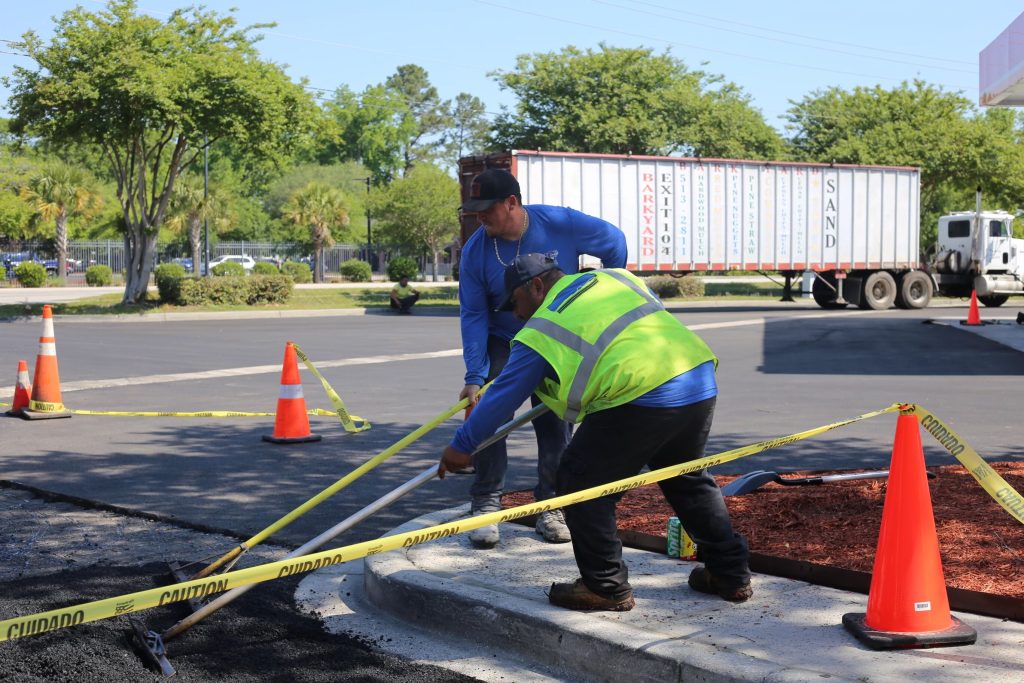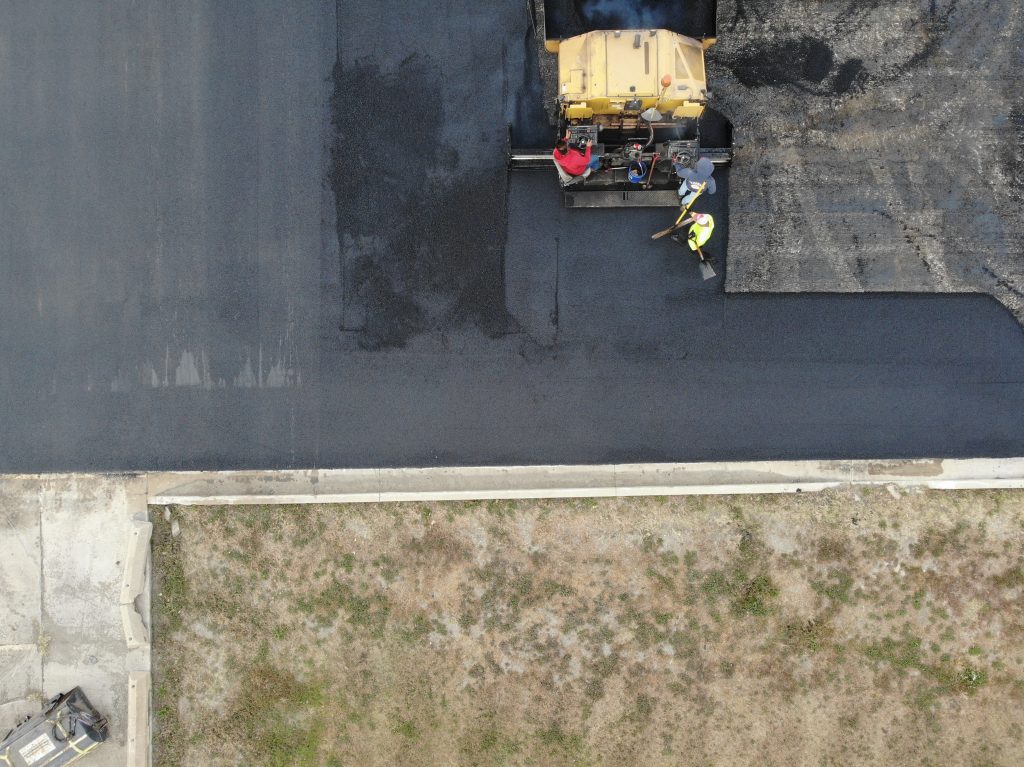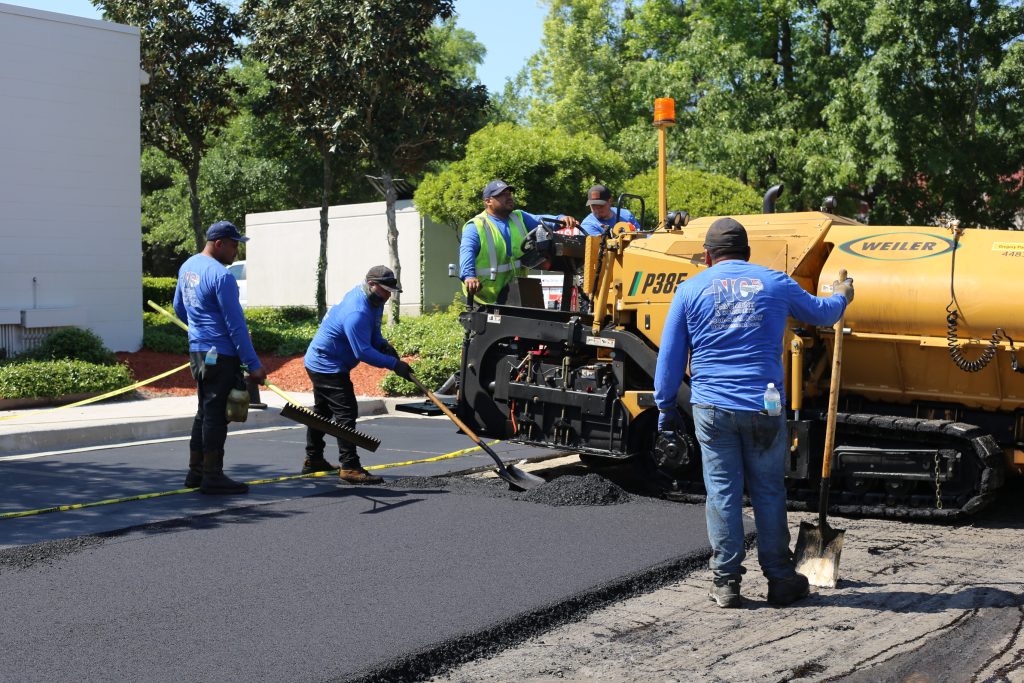The retail industry is evolving rapidly, and sustainability has become more than just a trend. It’s a business standard. As retail centers expand, property owners are looking for eco-friendly ways to improve parking lots and walkways without sacrificing durability or design. That’s where The Pavement Group leads the way with innovative, environmentally responsible paving solutions that meet today’s sustainability goals.
Retail centers have a unique challenge: balancing aesthetics, longevity, and eco-consciousness. The good news? Green paving technology now allows businesses to protect the planet while creating safer, longer-lasting surfaces.
Why Sustainability Matters in Retail Construction?
Modern consumers expect more from the brands they support. They value environmental responsibility as much as convenience and quality. When retail centers prioritize sustainability in their construction projects, they build stronger community trust and reduce long-term costs.
Eco-friendly paving not only minimizes carbon emissions but also reduces waste, conserves resources, and improves water management. Choosing sustainable materials and techniques reflects a company’s commitment to both environmental and social responsibility.
Retail spaces that adopt green infrastructure often see increased foot traffic and positive brand perception. Proving that environmental awareness can be great for business.
Understanding Eco-Friendly Paving Solutions
So, what exactly makes paving “eco-friendly”? Sustainable paving focuses on reducing environmental impact through materials, methods, and maintenance. It combines advanced engineering with nature-friendly practices that help preserve ecosystems while extending pavement life.
Let’s look at some of the top eco-friendly paving solutions used in today’s retail developments.
1. Permeable Pavement Systems
Permeable pavements are a game-changer for modern parking lots. These systems allow water to pass through the surface, reducing stormwater runoff and minimizing flooding. Instead of pooling on the surface, rainwater naturally filters through layers of stone and soil beneath the pavement.
This reduces the strain on city drainage systems and prevents contaminants from entering waterways. Retail centers with permeable parking lots not only meet sustainability standards but also create cleaner, safer environments for customers.
2. Recycled Asphalt and Concrete
Recycling old materials is one of the most effective ways to reduce construction waste. Recycled asphalt pavement (RAP) and recycled concrete aggregate (RCA) are increasingly used in retail paving projects.
These materials perform just as well as new aggregates while significantly lowering carbon emissions. By reusing what already exists, retail developers save money and reduce their project’s environmental footprint.
The Pavement Group specializes in blending recycled materials without compromising quality, ensuring your paved surfaces remain strong and visually appealing.
3. Cool Pavements and Reflective Coatings
Traditional asphalt absorbs heat, creating the “urban heat island” effect. Cool pavements, on the other hand, are engineered to reflect sunlight and reduce surface temperatures.
Retail centers using reflective coatings create cooler, more comfortable parking environments for shoppers. This not only improves customer experience but also helps lower nearby energy consumption.
Cool pavements can even extend pavement life by minimizing heat-related cracking and wear. Offering both environmental and financial benefits.
4. Warm-Mix Asphalt Technology
Warm-mix asphalt (WMA) represents a major advancement in paving sustainability. It uses lower production temperatures than conventional hot-mix asphalt, which reduces energy use and greenhouse gas emissions.
Despite its lower temperature, warm-mix asphalt delivers exceptional durability and performance. Retail centers benefit from smoother surfaces and faster installation times, minimizing disruptions to business operations.
This solution demonstrates how innovation and sustainability can coexist seamlessly in modern construction practices.
Designing Sustainable Parking Lots for Retail Centers
Sustainable paving isn’t just about materials. It’s also about smart design. A well-planned parking lot can optimize space, reduce runoff, and minimize maintenance costs.
Key design strategies include:
- Installing proper drainage systems to manage stormwater efficiently.
- Using lighter-colored materials to reduce heat absorption.
- Planting green spaces or bioswales to enhance water filtration.
These features not only make retail centers more environmentally responsible but also improve their visual appeal and functionality.
Long-Term Benefits of Eco-Friendly Paving
The benefits of sustainable paving extend far beyond environmental impact. Retail property owners experience improved longevity, lower maintenance costs, and enhanced brand reputation.
Eco-friendly pavements resist cracking, fading, and weather damage better than traditional materials. They require fewer repairs, saving time and resources over the years.
More importantly, adopting green construction practices positions retail centers as industry leaders committed to a sustainable future. Customers notice, and they remember.
“Our Parking Lot Became a Statement of Green Innovation.”
“We wanted to update our retail plaza with an eco-friendly parking solution that looked great and lasted longer. The Pavement Group introduced us to permeable paving and recycled asphalt options. The results were stunning—customers even commented on how much cooler and cleaner the space feels. It’s both beautiful and sustainable!”
— Stephanie H., Retail Center Manager, San Jose, CA
Testimonials like Stephanie’s show how green paving solutions are reshaping retail development across the country. Sustainability isn’t just good for the environment. It’s smart business.
How The Pavement Group Delivers Sustainable Results
At The Pavement Group, sustainability is more than a buzzword. It’s a commitment. Our team combines decades of expertise with state-of-the-art technology to deliver durable, environmentally responsible paving solutions for every retail project.
We focus on innovative materials, efficient project timelines, and precision craftsmanship. From design to installation, every step is carefully planned to reduce waste, lower emissions, and ensure top-quality results.
Our team also partners with property managers and developers to create long-term maintenance plans that extend pavement life and optimize sustainability efforts.
Investing in the Future of Green Infrastructure
Choosing eco-friendly paving is an investment in both your property and the planet. As environmental standards become stricter and consumers demand more sustainable businesses, retail centers must evolve.
Forward-thinking property owners recognize that going green today ensures profitability and resilience tomorrow. Sustainable pavements support compliance with environmental regulations, reduce operational costs, and demonstrate leadership in responsible development.
Now is the time to invest in paving solutions that align with your brand’s environmental values.
Build Your Sustainable Retail Future Today!
Ready to make your retail center greener, stronger, and more efficient? Partner with The Pavement Group for expert guidance on eco-friendly paving solutions that last.
Contact The Pavement Group today to schedule a consultation and discover how sustainable paving can elevate your retail property. Let’s pave the way toward a greener tomorrow.
Frequently Asked Questions
1. What are eco-friendly paving solutions for sustainable retail centers?
Eco-friendly paving solutions use sustainable materials and techniques that minimize environmental impact. These include permeable pavements, recycled asphalt, and cool pavement technologies. Such methods help retail centers reduce waste, improve drainage, and promote long-term environmental responsibility.
2. How does permeable pavement benefit retail parking lots?
Permeable pavement allows water to filter through the surface, reducing runoff and preventing flooding. It supports natural groundwater recharge and helps control pollution. Retail centers using permeable paving meet sustainability goals while creating cleaner, safer parking environments.
3. Why should retail centers invest in sustainable paving?
Sustainable paving reduces long-term maintenance costs and environmental impact. It improves energy efficiency and enhances the property’s visual appeal. For retail centers, it demonstrates a strong commitment to environmental stewardship and corporate responsibility.
4. What materials are used in eco-friendly paving for retail spaces?
Common sustainable materials include recycled asphalt, concrete aggregates, and warm-mix asphalt. These options use fewer natural resources and emit less carbon during production. They maintain durability while offering environmentally conscious construction alternatives.
5. How do cool pavements help reduce heat in retail parking areas?
Cool pavements reflect sunlight instead of absorbing it, keeping surfaces cooler during hot days. This reduces the “urban heat island” effect in large retail zones. Customers experience a more comfortable environment, and the property becomes more energy efficient.
6. Are recycled asphalt and concrete durable for retail paving projects?
Yes, recycled asphalt and concrete are just as durable as new materials when processed correctly. They deliver long-lasting strength with significantly lower environmental costs. Many retail properties use them successfully for high-traffic parking areas and walkways.
7. How does sustainable paving improve stormwater management?
Sustainable paving systems manage water more effectively by promoting natural absorption and filtration. Permeable designs reduce runoff and minimize drainage system overload. This keeps retail properties compliant with environmental standards and reduces flood risks.
8. Can eco-friendly paving solutions save money for retail developers?
Yes, sustainable paving can lower long-term costs through reduced maintenance and energy savings. Recycled materials are often more affordable than new resources. Over time, the investment in eco-friendly materials pays off with durability and efficiency.
9. What is warm-mix asphalt, and why is it eco-friendly?
Warm-mix asphalt is produced at lower temperatures than traditional hot-mix asphalt. This process reduces fuel use and greenhouse gas emissions. It delivers the same strength and performance while being safer for the environment.
10. How can retail centers make their parking lots more sustainable?
Retail centers can adopt green design principles like permeable pavements, cool surfaces, and recycled materials. Adding landscaping and bioswales improves drainage and air quality. Combining these elements creates a visually appealing, environmentally responsible retail space.


